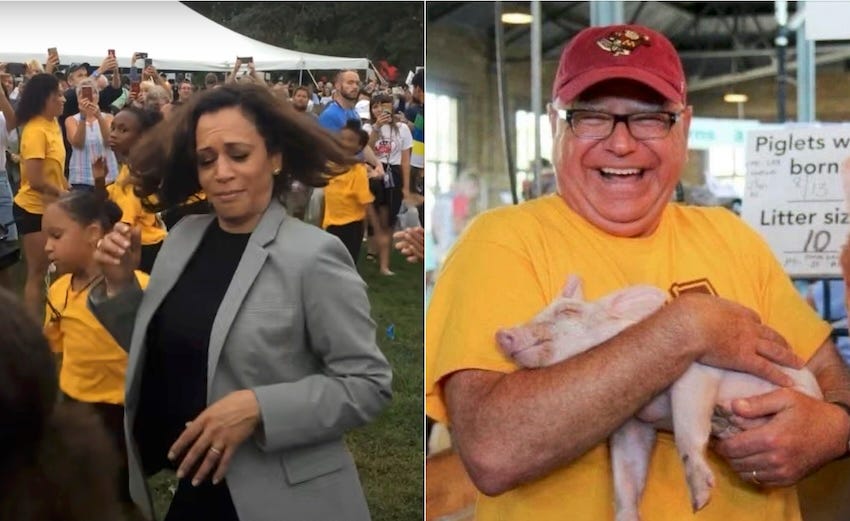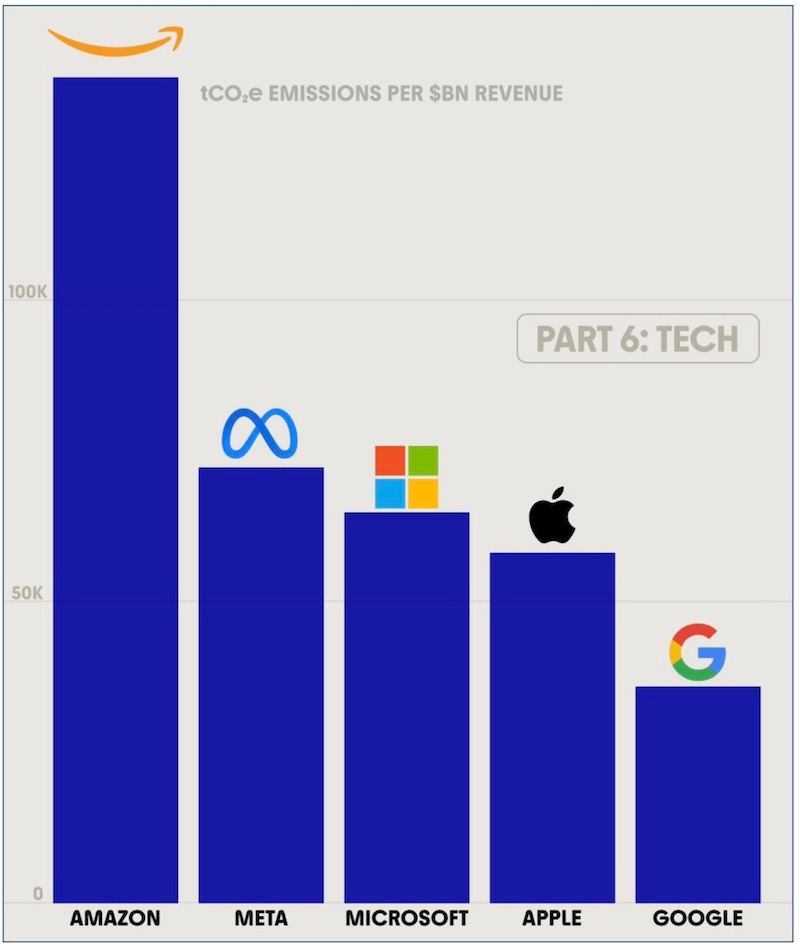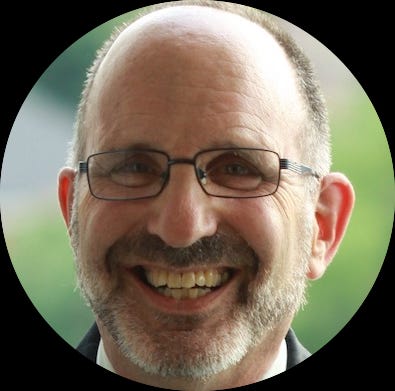Harris, Walz Show How to Win with Joy and Purpose
They’re fighting to avert a dreadful future. They’re doing it with joy. Whichever part of the climate and energy story you work on, this is how we show up to win.

It’s been an unexpected and unmitigated joy over the last couple of weeks to watch U.S. Vice President Kamala Harris and now Minnesota Governor Tim Walz on the campaign trail.
This is only partly because they’ve finally smashed through the endless all-Trump, all-the-time news cycles, in a serious challenge to the relentlessly vicious Project 2025 agenda that the rapist and convicted felon now leading the Republican Party will implement if he gets the chance.
In his first appearance as the Democrats’ vice-presidential nominee, Walz thanked Harris for “bringing back the joy” to the campaign. For both of them, by all appearances, that joy is powered by a shining sense of purpose that is so much bigger than themselves. It’s bigger than the November vote, bigger even than the dreadful inevitability that has dominated the North American political scene for nearly a decade.
The chance to roll back that sense of inevitability is the parallel between the election campaign now unfolding in the U.S. and the avowedly non-partisan, even multi-partisan scramble to get climate change under control.
There’s no joy in being up against an almost unspeakable evil, whether it’s Trump and his extremely “weird” running mate or the most devastating global crisis of our lifetimes.
But waking up every morning with the knowledge that that crisis can be solved, and that you’re lucky enough to live in a time and place when you can play a part in solving it? There’s no joy greater.
Veteran U.S. political analyst Teagan Goddard is calling it the “most dramatic month in presidential campaign history”, and that would be notable enough. But Harris and Walz are also cutting through the angry, toxically divisive political culture that has both driven and been driven by Trump’s takeover of one of the country’s two mainstream parties. They’re putting on a clinic in how to break down partisan barriers and counter the polarization, mistrust, and manufactured rage that are also obstructing the fast action we need to reduce climate pollution and get on with the energy transition.
And ultimately, if present trends continue, they’re showing how to win.
Coconut Trees, Camo Hats and the ‘Aggressively Normal Dad’
When Harris stepped up last month as the Democratic Party’s presidential nominee, she brought strong credentials as a confirmed climate hawk who had supported the Green New Deal, run lawsuits against oil and gas companies, sponsored climate equity legislation, and lent her support to a “first-ever international coalition to manage the transition away from fossil fuel production.”
But important as it is to put a climate and energy hawk in the White House, she won’t win on policy alone. Harris has reset the presidential campaign with viral memes about coconut trees—a shout-out to her late mother, the Montreal- and Berkeley-based cancer researcher Shyamala Gopalan Harris—and with pop star Charli XCX declaring her “brat”.
Now Walz is balancing and broadening that appeal, contributing his own political persona as the “aggressively normal dad” in a camo hat whose “extraordinarily normal life” and “Midwestern dad vibe” had a top Democratic Party official in his home state declaring him the anti-politician. After Walz “made a splash” on U.S. TV by declaring the Trump-Vance ideology “weird”, the New York Times reports, “photographs of Mr. Walz hugging a piglet or casting a line rose alongside dadcore fan fiction about how he would teach America to drive a stick-shift without making it cry and kneel down to re-chain its lawn mower while raising its wages and securing it free school lunches.”
To actually get stuff done at the speed and scale we need to super-charge the energy transition and push down climate pollution, the second half of that story matters as much as the first. And Walz, originally a rural member of Congress with deep ties to agriculture and conservation, has delivered in Minnesota.
“Once Democrats swept control of state government in the 2022 elections with Walz at the top of the ticket, they passed one of the most significant progressive agendas in the nation’s recent history with just a single-seat Senate majority,” writes the Minnesota Reformer. The greatest hits in the Reformer’s long recap of Walz’s legislative work include a 2040 target date to produce 100% of the state’s electricity from (mostly) carbon-free sources, supported by a state bill to speed up permitting for new renewable energy projects. In his first term, Walz also carried on a state legal challenge to the Line 3 pipeline replacement, though he disappointed pipeline opponents by declining to use his executive authority to stop the US$2.6-billion project in its tracks.
“I have to tell you, when I hear people say, ‘You’re moving too fast’—we can’t move too fast when it comes to addressing climate change,” Walz said in 2023, at the event at the St. Paul, Minnesota Labor Center where he signed the clean energy bill. “This idea of waiting is a luxury we do not have, and Minnesotans do not have.”
Being a Good Neighbour
Bringing two proven, knowledgeable, committed climate hawks to the highest offices in the land is a worthy goal in itself. But even more important, says veteran climate author and campaigner Bill McKibben, is the “good heart” and “good mind” that a Tim Walz brings to the climate fight.
“If we are going to both prevent the worst of the climate crisis, and cope with that which we can no longer prevent, then the most important thing we can do in this country is restore as much a sense of neighbourliness as possible,” McKibben writes.
“At the moment, if you have a credit card, you can get all that you need to survive delivered to your front door. But the next 75 years are going to be harder: as the climate crisis breaks over us, we’re going to have to relearn the skills, and the joys, of neighbourliness,” he explains. But “those skills help not just in time of crisis. They also, potentially, help as we work to build out the renewable energy we desperately need. In too many places a NIMBY approach has taken hold, when what we need is a Yes In Our Neighborhood willingness to build the local energy economies we require.”
That kind of “genial attempt to make everyone a friend can turn into an all-of-the-above energy policy that has bedeviled us,” McKibben adds. “But Walz seems to have some steel, too—a kind of populism that one hopes will keep him from embracing Big Oil’s endless schemes (carbon capture, hydrogen production, and so on) to keep the day of climate reckoning at a distance.”
Reaching Across the Divide
Determined but neighbourly. Genial but steely. Following the evidence while respecting the community. And have I mentioned joyous? That’s the hopeful yet practical political persona that is sweeping the United States at the moment, against which the Trump campaign is having a devil of a time finding an effective comeback.
And it holds such an important lesson for anyone trying to reach outside the “bubble” of climate and energy concern and build a wider community of support—whether the immediate goal is to restrict and scale back fossil fuel development, get a renewable energy project off the ground, or push for tougher climate policy or legislation.
Look no farther than another devastating wildfire season and month after month of record-breaking heat to know that we live in desperately serious times. But when climate hawks come across serious and desperate, without signposting the opportunities in the energy transition and the pathways for bringing them to life, is it any wonder that so many people shut down or lapse into climate grief and despair?
Look no farther than the weekly headlines to see that local opposition to renewable energy and energy storage projects is becoming far more common. A good share of that pushback is funded by fossil fuel interests, and some of it is built on the most idiotic myths and ridiculous conspiracy theories. But is it realistic for developers to expect automatic assent if they show up with limited information and a tight timeline to get a project approved? Are there times when we can get farther, faster if we slow down a bit, just enough to give the community a chance to form an opinion and get onboard?
And in both of those situations and so many more, will it help build wider trust and buy-in if we lead with joy and a shared sense of purpose? By listening to the priorities people woke up with this morning and aligning our thinking with what matters most to them? By taking a cue from the Canadian Purpose Economy Project, which is imagining
an economy powered by the pursuit of long-term well-being for all, in which business and regulatory and financial systems foster an equitable, flourishing, resilient future?
By celebrating the fact that a camo-wearing, gun-owning, piglet-hugging, 24-year National Guard veteran in the United States might be one of the most effective allies for faster, deeper carbon cuts and 100% clean electricity?
For the most part, this isn’t the climate and energy community we’ve been until now. But maybe it’s the wider community we need to become—both to meet our immediate objectives and to help push back the dangerous polarization that is pulling our country and other parts of the world in the opposite direction.
Mitchell Beer traces his background in renewable energy and energy efficiency back to 1977, in climate change to 1997. Now he and the rest of the Energy Mix team scan 1,200 news headlines a week to pull together The Energy Mix, The Energy Mix Weekender, and our weekly feature digests, Cities & Communities and Heat & Power.
Chart of the Week

Alberta Moratorium Costs Communities $91M in Tax Revenue, Cancels 53 Renewables Projects
Divert Dollars from Emission Cuts to Climate Preparedness, Adaptation Expert Says
Drought Costs U.S. Hydropower Billions While Increasing Emissions, Study Finds
Risk of Dangerous Climate Tipping Points Rises with Each 0.1°C of Warming, New Analysis Shows
NOT THE ONION: Oil Demand Will Never Peak, U.S. Think Tank Claims
Wet’suwet’en Chief Declared Canada’s First Prisoner of Conscience
Wind and Solar Overtake Fossil Fuels in ‘Historic Shift’ for EU
Don’t Block EV Imports from China, Op Ed Urges, as BYD Tips Plans to Set Up Shop
U.S. Permitting Bill Would Speed Up Grid Infrastructure, Support LNG Development
TC Energy CEO Francois Poirier to join CIBC’s board of directors (The Canadian Press)
China plans new carbon emission controls as it aims for 2030 peak (Reuters)
‘Critical turning point’ for coal poses risks for China’s state power firms, says report (Carbon Brief)
Alberta green jobs forecast to increase over next decade, but challenges remain (Canadian Broadcasting Corporation)
Oil and gas jobs decline amid record-breaking production (E&E News)
Red-State Republicans Say They’ll Defend Biden-Era Green Jobs (Bloomberg)
Climate change deniers make up nearly a quarter of US Congress (The Guardian)
Li-Cycle lowers losses in Q2, closes Kingston facility (Sustainable Biz)
Deforestation in Brazil’s Amazon rainforest is down to lowest level since 2016, government says (The Associated Press)
Wildfires in Brazil’s Pantanal wetland fuelled ‘by climate disruption’ (The Guardian)
Climate scientists answer viewers’ questions on France’s ratings-topping weather forecast (EuroNews)
Heat in European region kills 175,000 a year, WHO estimates (Canadian Broadcasting Corporation)







Well done, @Mitchell Beer. This is the shove for any undecidedss. Thoughtful about all all issues and forthright, we are gonna do this
Yahoo! Yes, they're just what we need ... even if we hadn't realized it. :)) BTW non-Americans can participate in the phone canvass for Kamala and Tim. It's all legal. Google "Make calls for Kamala Harris"